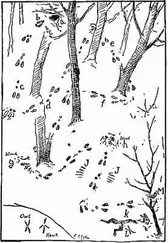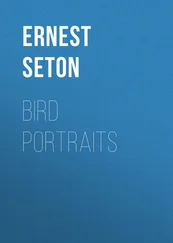Ernest Seton - Rolf in the Woods
Здесь есть возможность читать онлайн «Ernest Seton - Rolf in the Woods» весь текст электронной книги совершенно бесплатно (целиком полную версию без сокращений). В некоторых случаях можно слушать аудио, скачать через торрент в формате fb2 и присутствует краткое содержание. Год выпуска: 1997, Жанр: Приключения про индейцев, Исторические приключения, на английском языке. Описание произведения, (предисловие) а так же отзывы посетителей доступны на портале библиотеки ЛибКат.
- Название:Rolf in the Woods
- Автор:
- Жанр:
- Год:1997
- ISBN:нет данных
- Рейтинг книги:3 / 5. Голосов: 1
-
Избранное:Добавить в избранное
- Отзывы:
-
Ваша оценка:
- 60
- 1
- 2
- 3
- 4
- 5
Rolf in the Woods: краткое содержание, описание и аннотация
Предлагаем к чтению аннотацию, описание, краткое содержание или предисловие (зависит от того, что написал сам автор книги «Rolf in the Woods»). Если вы не нашли необходимую информацию о книге — напишите в комментариях, мы постараемся отыскать её.
Rolf in the Woods — читать онлайн бесплатно полную книгу (весь текст) целиком
Ниже представлен текст книги, разбитый по страницам. Система сохранения места последней прочитанной страницы, позволяет с удобством читать онлайн бесплатно книгу «Rolf in the Woods», без необходимости каждый раз заново искать на чём Вы остановились. Поставьте закладку, и сможете в любой момент перейти на страницу, на которой закончили чтение.
Интервал:
Закладка:
Although so seldom seen there is no doubt that the marten comes out chiefly by day. That night the trap remained unsprung; next morning as Rolf went at silent dawn to bring water from the lake, he noticed a long, dark line that proved to be ducks. As he sat gazing he heard a sound in the tree beyond the cabin. It was like the scratching of a squirrel climbing about. Then he saw the creature, a large, dark squirrel, it seemed. It darted up this tree and down that, over logs and under brush, with the lightning speed of a lightning squirrel, and from time to time it stopped still as a bump while it gazed at some far and suspicious object. Up one trunk it went like a brown flash, and a moment later, out, cackling from its top, flew two partridges. Down to the ground, sinuous, graceful, incessantly active flashed the marten. Along a log it raced in undulating leaps; in the middle it stopped as though frozen, to gaze intently into a bed of sedge; with three billowy bounds its sleek form reached the sedge, flashed in and out again with a mouse in its snarling jaws; a side leap now, and another squeaker was squeakless, and another. The three were slain, then thrown aside, as the brown terror scanned a flight of ducks passing over. Into a thicket of willow it disappeared and out again like an eel going through the mud, then up a tall stub where woodpecker holes were to be seen. Into the largest it went so quickly Rolf could scarcely see how it entered, and out in a few seconds bearing a flying squirrel whose skull it had crushed. Dropping the squirrel it leaped after it, and pounced again on the quivering form with a fearsome growl; then shook it savagely, tore it apart, cast it aside. Over the ground it now undulated, its shining yellow breast like a target of gold. Again it stopped. Now in pose like a pointer, exquisitely graceful, but oh, so wicked! Then the snaky neck swung the cobra head in the breeze and the brown one sniffed and sniffed, advanced a few steps, tried the wind and the ground. Still farther and the concentrated interest showed in its outstretched neck and quivering tail. Bounding into a thicket it went, when out of the other side there leaped a snowshoe rabbit, away and away for dear life. Jump, jump, jump; twelve feet at every stride, and faster than the eye could follow, with the marten close behind. What a race it was, and how they twinkled through the brush! The rabbit is, indeed, faster, but courage counts for much, and his was low; but luck and his good stars urged him round to the deer trail crossing of the stream; once there he could not turn. There was only one course. He sprang into the open river and swam for his life. And the marten—why should it go in? It hated the water; it was not hungry; it was out for sport, and water sport is not to its liking. It braced its sinewy legs and halted at the very brink, while bunny crossed to the safe woods.
Back now came Wahpestan, the brown death, over the logs like a winged snake, skimming the ground like a sinister shadow, and heading for the cabin as the cabin's owner watched. Passing the body of the squirrel it paused to rend it again, then diving into the brush came out so far away and so soon that the watcher supposed at first that this was another marten. Up the shanty corner it flashed, hardly appearing to climb, swung that yellow throat and dark-brown muzzle for a second, then made toward the entry.
Rolf sat with staring eyes as the beautiful demon, elegantly spurning the roof sods, went at easy, measured bounds toward the open chink—toward its doom. One, two, three—clearing the prickly cedar bush, its forefeet fell on the hidden trap; clutch, a savage shriek, a flashing,—a struggle baffling the eyes to follow, and the master of the squirrels was himself under mastery.
Rolf rushed forward now. The little demon in the trap was frothing with rage and hate; it ground the iron with its teeth; it shrieked at the human foeman coming.
The scene must end, the quicker the better, and even as the marten itself had served the flying squirrel and the mice, and as Quonab served the mink, so Rolf served the marten and the woods was still.
Chapter 29.
Snowshoes
"That's for Annette," said Rolf, remembering his promise as he hung the stretched marten skin to dry.
"Yi! Yi! Yi!" came three yelps, just as he had heard them the day he first met Quonab, and crossing the narrow lake he saw his partner's canoe.
"We have found the good hunting," he said, as Rolf steadied the canoe at the landing and Skookum, nearly well again, wagged his entire ulterior person to welcome the wanderer home. The first thing to catch the boy's eye was a great, splendid beaver skin stretched on a willow hoop.
"Ho, ho!" he exclaimed.
"Ugh; found another pond."
"Good, good," said Rolf as he stroked the first beaver skin he had ever seen in the woods.
"This is better," said Quonab, and held up the two barkstones, castors, or smell-glands that are found in every beaver and which for some hid reason have an irresistible attraction for all wild animals. To us the odour is slight, but they have the power of intensifying, perpetuating, and projecting such odorous substances as may be mixed with them. No trapper considers his bait to be perfect without a little of the mysterious castor. So that that most stenchable thing they had already concocted of fish-oil, putrescence, sewer-gas, and sunlight, when commingled and multiplied with the dried-up powder of a castor, was intensified into a rich, rancid, gas-exhaling hell-broth as rapturously bewitching to our furry brothers as it is poisonously nauseating to ourselves—seductive afar like the sweetest music, inexorable as fate, insidious as laughing-gas, soothing and numbing as absinthe—this, the lure and caution-luller, is the fellest trick in all the trappers' code. As deadly as inexplicable, not a few of the states have classed it with black magic and declared its use a crime.
But no such sentiment prevailed in the high hills of Quonab's time, and their preparations for a successful trapping season were nearly perfect. Thirty deadfalls made by Quonab, with the sixty made on the first trip and a dozen steel traps, were surely promise of a good haul. It was nearly November now; the fur was prime; then why not begin? Because the weather was too fine. You must have frosty weather or the creatures taken in the deadfalls are spoiled before the trapper can get around.
Already a good, big pile of wood was cut; both shanty and storeroom were chinked, plugged, and banked for the winter. It was not safe yet to shoot and store a number of deer, but there was something they could do. Snowshoes would soon be a necessary of life; and the more of this finger work they did while the weather was warm, the better.
Birch and ash are used for frames; the former is less liable to split, but harder to work. White ash was plentiful on the near flat, and a small ten-foot log was soon cut and split into a lot of long laths. Quonab of course took charge; but Rolf followed in everything. Each took a lath and shaved it down evenly until an inch wide and three quarters of an inch thick. The exact middle was marked, and for ten inches at each side of that it was shaved down to half an inch in thickness. Two flat crossbars, ten and twelve inches long, were needed and holes to receive these made half through the frame. The pot was ready boiling and by using a cord from end to end of each lath they easily bent it in the middle and brought the wood into touch with the boiling water. Before an hour the steam had so softened the wood, and robbed it of spring, that it was easy to make it into any desired shape. Each lath was cautiously bent round; the crossbars slipped into their prepared sockets; a temporary lashing of cord kept all in place; then finally the frames were set on a level place with the fore end raised two inches and a heavy log put on the frame to give the upturn to the toe.
Читать дальшеИнтервал:
Закладка:
Похожие книги на «Rolf in the Woods»
Представляем Вашему вниманию похожие книги на «Rolf in the Woods» списком для выбора. Мы отобрали схожую по названию и смыслу литературу в надежде предоставить читателям больше вариантов отыскать новые, интересные, ещё непрочитанные произведения.
Обсуждение, отзывы о книге «Rolf in the Woods» и просто собственные мнения читателей. Оставьте ваши комментарии, напишите, что Вы думаете о произведении, его смысле или главных героях. Укажите что конкретно понравилось, а что нет, и почему Вы так считаете.




